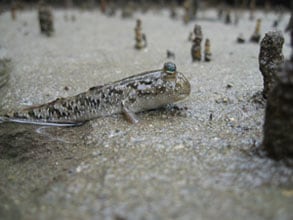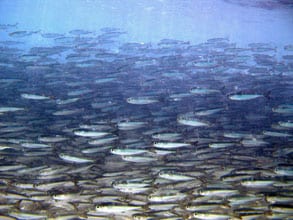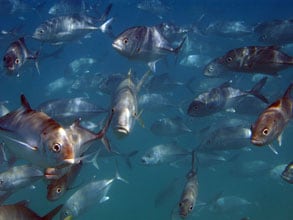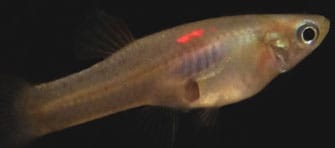
Animal Behaviour Lab

Our aims
We aim to develop a broad understanding of animal behaviour across a range of ecological contexts. In doing so, we aim to provide vital insight to a variety of other disciplines, both within the biological sciences (physiology, conservation biology, toxicology, ecology) and beyond (psychology, sociology, economics).
Our research
We consider a diverse range of topics within our research, and of course these topics very often overlap. In addressing our research questions, we primarily (though not exclusively) use fish as our model study species and we divide our time between the laboratory at the University of Sydney and various field sites including One Tree Island on the Great Barrier Reef, Narrabeen Lagoon in NSW, and even the estuaries of Lincolnshire in the UK.
Below is a selection of our main research themes:
Research themes
Thousands of animal species form into groups and in many cases, these groups are characterised by highly synchronised, co-ordinated collective behaviour.
But how can a multitude of individuals act as though they were all of one mind?
How do social animals make collective decisions? Should social animals, such as fish, lemmings or even humans, blindly follow their leaders, or should they risk isolation from the group by acting more independently?
Animals constantly gather information which can then be used to make decisions. They can acquire information either directly, by sampling their environment and collecting their own information, or indirectly, by gathering information socially, usually from conspecifics. Acquiring direct, ‘private’ information is costly and time-consuming, but it does have the important benefit of accuracy.
Social information by contrast is inexpensive to acquire but there is no guarantee of its accuracy. How then should animals balance their use of private and social information, when should they rely on private information and when on social? And can they adapt their behaviour so that they preferentially weight social information that comes from a reliable source, i.e. can they discriminate between conspecifics and the information that they provide?
The ability to recognise and differentiate between conspecifics is crucial for structuring the interactions between animals and ultimately for their social organisation. In freshwater fishes, social recognition is known to be achieved using a combination of different sensory cues though recent findings suggest that chemical cues may be of greatest importance.
These cues are strongly influenced by the fish’s physiology, and its recent habitat and diet, hence not only do fish use these cues to recognise they can also gather information about each other which will influence their interactions. Far less is known about how marine fish recognise and communicate with each other and this remains an important topic for research.

Physiology is the driver of animal behaviour and by combining behavioural and physiological approaches to research questions, we can gain fascinating insights into what makes animals ‘tick’. For example, how do animal respond to stress? What determines fighting ability? Why do individuals vary in their willingness to accept risk in order to gain rewards, thereby occupying different positions on the so-called ‘bold-shy continuum’?
These and many other areas of animal behaviour can benefit hugely from the adoption of a multi-disciplinary research perspective.
While these four topics represent the bulk of our research, we do not restrict ourselves to these. In recent years we have also researched and published on allied topics, including predator-prey interactions, sexual and mate-choice behaviour, and aquatic toxicology.

Opportunities
I am always happy to receive enquiries either from within Australia, or beyond, from enthusiastic and hard-working people who are interested in studying for a PhD. The research topics for any new PhD student would likely be focussed on one of our four main areas of research: social and collective behaviour; learning and information use; recognition and communication; and, the integration of behaviour and physiology. Within these broad areas, I’d welcome the opportunity to discuss with each student how their research plan can best be designed to fit with their interests.
Honours Students
We typically work with between two and three honours students per year in the Animal Behaviour Lab.
For information about opportunities to work or collaborate with the Animal Behaviour lab, email ashley.ward@sydney.edu.au
Students
Mia Kent
Using fish as a model system, my PhD focuses on the phylogeny of collective behaviour and the evolutionary benefits associated with group-living.
Prior to starting my PhD, I worked in animal behaviour and physiology labs within the University of St Andrews, Lehigh University and Hamburg University. Throughout this time, I developed an interest in the mechanisms and functions of collective behaviour.
Alicia Burns
After studying shoaling behaviour and group decision making during my Honours year I became fascinated with how individuals with starkly different behavioural tendencies or ‘personalities’ can still function as cohesive groups.
This led me to a PhD looking at the functions and mechanisms of animal personalities and the way in which individual variation in behaviour affects the behaviour of a group or population.
- Stephanie Bamford
- Therese Chen
- Dr Matthew Hansen
- Dr James ‘Teddy’ Herbert-Read
- Dr Alex Jordan
- Deluxmi Logendran
- Kieran MacKenzie
- Anna O'Brien
- Phoebe O'Leary
- Camilla Raven
- Amelia Reid
- Douglas Roy
- Dr Timothy Schaerf
- Song-Hee Schumacher
- Melissa Wong
- Shirley Zhu



